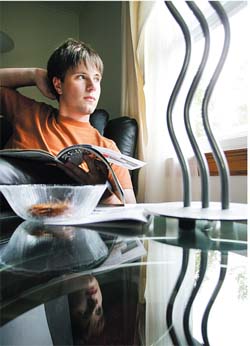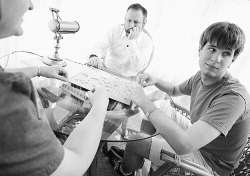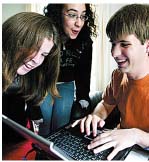| |
||
| |
||
When I said that I was gay, my father's reaction was 'Pass the potatoes.'
By ABRAM MORGAN
Special to The News
8/27/2006
Of course, chickening out was an option. It always was, even if I had planned this out in advance.
"I have something to tell you tomorrow," I told Cassie the day before, binding myself to telling her. Hoping she'd forgotten, I signed on to AOL and looked at the message that she sent me the moment I signed on. "What is it? Oh, and by the way, Emily slept over and she's wondering what it is, too."
So there I was, staring at the computer screen on Valentine's Day, about to bare my soul to two friends I had known for less than seven months.
"I think I might be gay," I typed, changing my font to smaller and smaller, finally reversing the font colors at the end: if they couldn't read it, then that was all the better. I hit enter after typing the last word (which took forever to type), and immediately signed off.
Running through the house, I frantically tried to go through the reasoning of why I had ruined my entire life. Why would I tell anyone that? I had just made the next four to eight years of my life a living hell. Of my own volition.
I showered, dried off, got dressed, and nervously sat, trying to not think about signing on to AOL again. Eventually, I clicked, immediately hit cancel, spent another five minutes staring at the screen, and clicked again. Signing on, I looked at their combined message, which said "We love you, Abe!"
It was the most relieving thing in the world. We had a very long discussion about when I had first started to wonder (since ever); when I had known, (middle school), and when I had admitted it to myself (New Year's of 2004, just two months earlier).
For a couple of days, I immersed myself in talking to them, reveling in the fact that I was out and they were OK with it. I got to talk about which guys at our school were hot, which were hot and total jerks at the same time, and which guys were suitable boyfriend material.
I was always careful. We had a system that if either of us was in danger of having someone read over our shoulder, we'd instantly start talking about school, in lots of little, short bites that would fill the current screen, which only held about four lines in the viewer. Eventually, though, Emily suggested I tell my parents. So, with both Emily's and Cassie's assurances that I would feel better after I had told them, I nervously sat down to dinner on Feb. 18, 2004.
We always say a prayer before dinner, and my prayer ended with "Let us find the courage to share what's heavy on our hearts." My mom asked, "Do you have something heavy on your heart?" and that was the conversation starter.
When I said that I was gay, my father's reaction was "Pass the potatoes."
It was a dream come true. My mother had some questions, mainly regarding who I had told and if I realized that being gay and out was dangerous. But overall they were fine. Nothing really changed at home, except in a positive way. We had always made gay jokes like mother-in-law or blond jokes, but now "pass the fruit" became a double entendre.
The reason I was able to come out to my parents so soon after telling my friends was based on several key points: My parents and I have a wonderful relationship; my parents are politically "liberal" regarding social issues (but conservative regarding the economic ones); and their constant reassurances that they would always love me.
Later that year, in April, I came out to my larger group of friends my parents call "the posse." On the way home from a Masterminds meet (a fun geek thing), I tried to tell a guy friend who I believed would take it well. I sat in the seat with him, really nervous. After all, guys are weirder about this stuff than girls, but this guy was pretty tolerant of just about everyone.
One of the girls nearby somehow realized I was sharing something private, and she said, "Well, if you don't tell us all, I will just assume you are a homosexual." In a split second I made the decision and responded with, "Well, you see, that's the thing - "
A moment of silence was followed by a large contingent of the group (about eight of the 11) saying, "That's so cool!" I was a bit confused by that, but I was happy they thought it was good thing. Everyone, even if they didn't think it was "cool," was OK with it.
The whole school knows
I came out slowly after that, telling a few people at a
time, finally coming out to my school (and thus the whole of Grand Island,
i.e., my world) on National Coming Out Day on Oct. 11, 2005.
My friends all knew, of course, and were rooting for me as I walked down the halls of Grand Island High School wearing a shirt saying "Celebrate National Coming Out Day, October 11th, 2005," on the front, and "Closets are for Clothes," on the back. I knew I had friends in almost every class to fall back on if the day went badly.
My parents were scared stiff. They had gone to Grand Island High School and were convinced the climate was the same as theirs, 20 years earlier. I did not, however, come home with their expectations of a black eye or worse.
It was an interesting insight to a larger group's reaction to the knowledge that I was gay. The school population broke down into four basic parts. One saw the shirt, knew what it was, and either didn't care or accepted me; another didn't even read the shirt, or didn't see it (surprisingly little for the latter), and found out later through talk and gossip; another group didn't know what "coming out" meant; the last group didn't believe me when I said I was gay and for the next week I answered countless variations of the question, "Are you really gay?"
My teachers were generally in a tough position. National Coming Out Day is not a socially "sanctioned" event. Gay people are, most importantly for them, a hot political topic. Political topics are supposed to be off limits for teachers, who have to initiate enough dialogue from both sides to obscure their political leaning, or avoid the entire subject of politics altogether.
Strangely enough, this has a lot in common with being gay.
So my teachers were generally prohibited from expressing their approval or disapproval in the classroom, because teachers are seen as important role models who might unduly influence the political leanings of a student. In one class, I was given a round of applause, for which I was entirely appreciative, and that was the only overt reaction I came across.
Some teachers read my shirt and raised their eyebrows in surprise. Some read it out loud and stopped partway through, realizing it might be a touchy subject. Other various reactions all had the same in common: discreetness (except for the one round of applause, but that was definitely out of the ordinary).
Acceptance
The reaction at Grand Island High School since my coming out
has been incredible. I have received a mere one insult to my face. I don't
know or care about anything I don't hear, and that was more of a snide
passing remark than anything else.
I have been in classes with most of the students since kindergarten, and all of them know me as Abram Morgan, a fellow classmate. They know the Abe Morgan who plays French horn, is in Advanced Placement classes, takes an active role in his community with groups such as DeMolay, works and attends church, although not lately, because I work at Wendy's on most Sundays.
Perhaps because of this familiarity, I am not that gay kid, Abe Morgan. I am Abe Morgan, who happens to be gay.
During my coming-out process, I was introduced to GLYS (Gay and Lesbian Youth Services). It was crucial in my total acceptance of myself, because even if you realize and know that you are gay, fully realizing that this is who you are and all the implications because of it is kind of overwhelming.
It is an organization funded by several governmental agencies, the United Way and individual donors. Without them, I am not sure where I would have gone for help during my two months of confusion and occasional outright despair. (If you want to check them out, go to www.glyswny.org.
I am not a "regular" due to the 30-minute one-way trip to get to the drop-in center in Buffalo. However, I do know I am always welcome and have a good time, talking or playing board games. The center itself is just a place for gay teens in any stage of the coming-out process or their allies, who are crucial supporters, to go and be in a place free from hate and violence.
I worked with the GLYS center after coming out to establish a satellite group on Grand Island, where I and my friends go one day of every month. The reason for the satellite is to help teens such as I, who can't trek to the drop-off center, or for those who don't wish to tell their parents just yet who they are.
It is a place to be out and proud, as well as a place for straight allies to go to show their support for their friends of the gay community.
Lots of company
Being out is liberating. No longer do I have to stand by
while people who don't know about me make callous remarks about gay
people. Nor do I have to watch snippets of the Pride parade while sitting
at home, desperately wishing I was there, marching with people who are
from all walks of life, but who have in common the experiences of being
gay in today's society.
If you think that gay people aren't around, reconsider. The low end places the number of gay people at one in 20; the high end is one in five. Ultimately, most studies agree on an average of one in 10. So as you wait for the bus, or stand in line at the supermarket, count the number of people around you. Divide that by 10, and you have the number of people around you who are gay, lesbian, bisexual or trans-gender.
They may not be out, or even have admitted it to themselves yet, but they are there, and every comment or remark regarding gay people influences their lives.
A casual insult
The number of times I hear, "That's so gay," in my
school is ridiculous. It may not seem like a big deal, but each time
someone says that, it's like inserting a racial slur into a common phrase
of speech, because instead of gay, people mean "stupid, dumb,
irritating," or any number of negative adjectives.
Each time it's used, it reinforces the feeling that being gay is considered inferior, which is, unfortunately, true.
In the United States, we are not allowed to serve openly in the military, we are not allowed to get married, and displaying our affection is even illegal in some areas. In the world, there are only four countries where homosexuals are allowed to get married, and there are six where being gay is punishable by death.
Not that being killed for being gay is limited to the far corners of the world: people are killed by extreme homophobic people all the time in rural and urban America. Many times, no one cares that someone has been killed, as long as they were nonconformists.
Many people who are homophobic generally think being gay is a choice. I can tell you it isn't. Why in the world would someone choose to be discriminated against in almost every facet of their life? I didn't wake up one day and say, "Hmm, just to rock the boat a little, I think I'll fancy men from now on!" I realized after a lot of searching, "Oh no, I'm gay."
Fear is a way of life
Being gay in and of itself is not negative. It is the
reactions of others that make it negative. I have basically cheated the
system. My parents love me and take my homosexuality in stride. My friends
accept me and welcome me with open arms. My school, even if it doesn't
accept me, tolerates my homosexuality and interacts with me the same way
regardless of who I want to date. My community, my church, youth groups
and those who know me have shown amazing acceptance and support.
I am very lucky. According to the Youth Risk Behavior Survey, prepared by the U.S. Centers for Disease Control and Prevention, more than one in four teens identified as gay, bisexual, lesbian, or trans-gender missed school in the last month. Not because they didn't want to attend class, or wanted to have a relaxing day, but because they were afraid. Imagine not being able to attend school because you feared violence, not being able to walk the halls of your school because you thought your life or physical well-being was in danger.
In addition, nearly one in three gay teens reported being threatened with weapons in the last month, as well as nearly one half of gay and lesbian teens surveyed reported property damage in the last month. One can assume that most of these teens overlap, but it's still a startling figure.
For something that isn't a choice, like being black or being born with red hair, this is a startling figure of animosity and outright hatred.
What the future holds
These threats will follow me the rest of my life. Wanting to
become a high school teacher or college professor, the school I work in
will have to be gay-friendly. Even which college I attend to obtain my
teaching degree will be influenced by whether or not a strong Gay Straight
Alliance is present.
The degree to which I am able to live openly with my partner is also a concern. Ideally, I want to be able to hold hands with him as we walk the streets of my hometown without fear of violence or condemnation. I want to be able to go to the movies and laugh and smile with everyone else. I want to be able to own a home with him and maybe adopt a child. It would be nice to name him as the beneficiary on my retirement plan and share a health-care plan as a sanctioned couple.
I am not being naive; I know that not all of it will happen. We might not even be able to seal our vows as a legal marriage, but I can hope. Today's society is far from the repressive 1940s and '50s, but we still have a long way to go to accept gays, lesbians, bisexuals and trans-genders as full people and citizens.
Maybe within my lifetime, I will get married to the man of my dreams: then again, maybe not.
I hope I'll be able to do everything I want. Up until now, everything has been possible. There isn't any reason I can't make the future the same. Being gay does not define who I am. It is only a small, but important, portion of what makes up my soul.
Abram Morgan, 18, will be a senior this fall at Grand Island High School.


